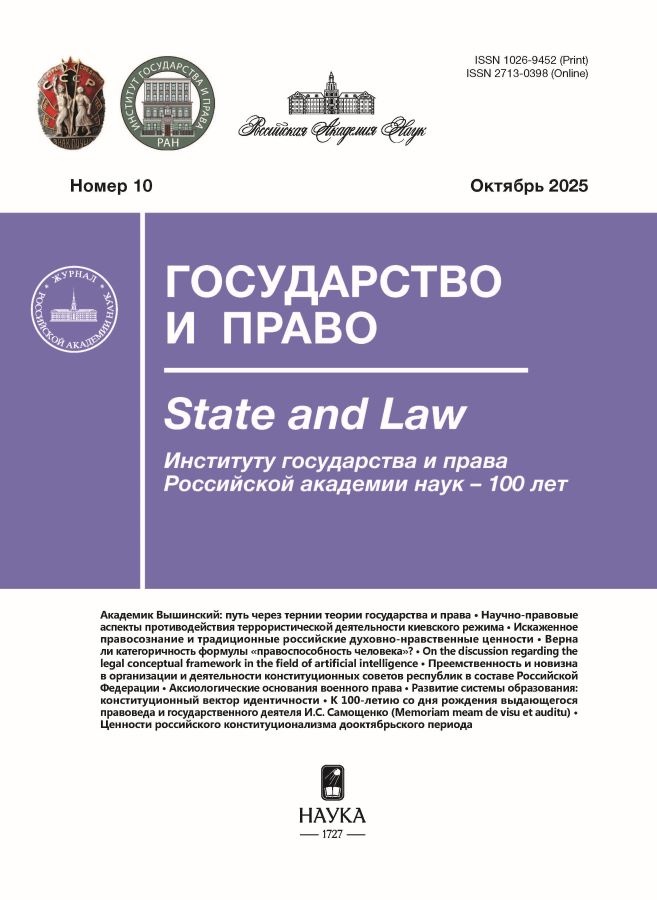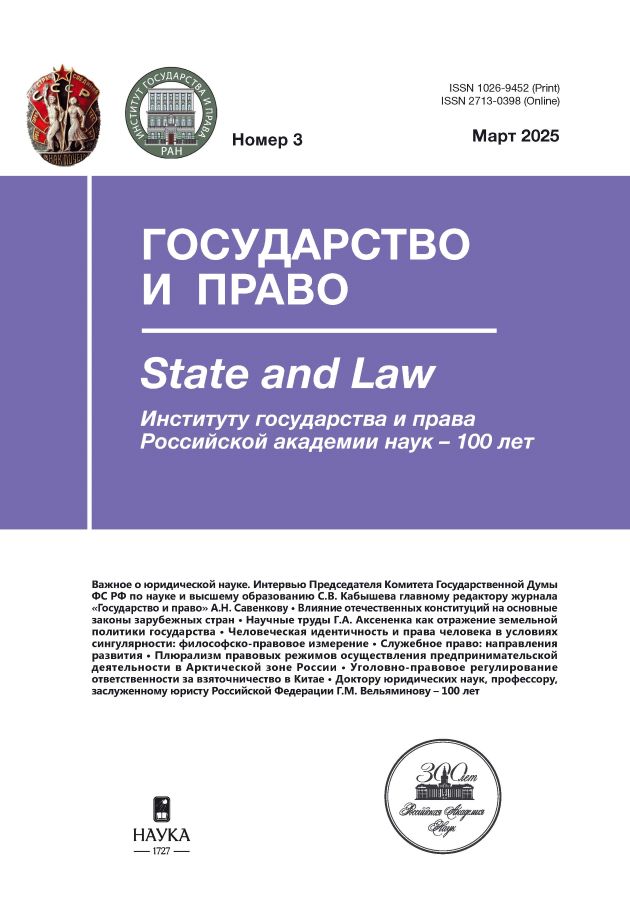Человеческая идентичность и права человека в условиях сингулярности: философско-правовое измерение
- Авторы: Овчинников А.И.1, Кроткова Н.В.2, Фатхи В.И.3
-
Учреждения:
- Южный федеральный университет
- Институт государства и права Российской академии наук
- Ростовский юридический институт МВД России
- Выпуск: № 3 (2025)
- Страницы: 39–48
- Раздел: Философия права
- URL: https://filvestnik.nvsu.ru/1026-9452/article/view/683015
- DOI: https://doi.org/10.31857/S1026945225030033
- ID: 683015
Цитировать
Полный текст
Аннотация
Сегодня мир стоит на пороге шестого технологического уклада и новой научно-технической революции. Развитие технологий искусственного интеллекта трансформировало практически все сферы жизнедеятельности человека, оказало влияние на его социокультурное пространство, формируя новые модели самосознания и самоидентификации личности, меняя представление о свободе, правах и обязанностях. В условиях цифровой парадигмы появляется идея цифровых прав человека как ответа на новые, ранее неизвестные угрозы человеческой идентичности. Особое внимание в статье уделяется воздействию цифровых технологий на биологическую и социальную (духовную) природу человека. Постулируется, что цифровые технологии оказывают влияние если не на сущность человека, то на самовосприятие этой сущности, на образ и смыслы жизни человеческой личности, создавая предпосылки для утверждения о становлении нового поколения прав человека.
Полный текст
Об авторах
Алексей Игоревич Овчинников
Южный федеральный университет
Автор, ответственный за переписку.
Email: k_fp3@mail.ru
ORCID iD: 0000-0002-4301-9962
доктор юридических наук, профессор, заведующий кафедрой теории и истории государства и права, проректор по научной работе Донской духовной семинарии, иерей
Россия, 344002 Ростовская область, г. Ростов-на-Дону, ул. Максима Горького, д. 88Наталья Викторовна Кроткова
Институт государства и права Российской академии наук
Email: krotkova2012@yandex.ru
ORCID iD: 0000-0003-2853-1287
кандидат юридических наук, ведущий научный сотрудник сектора конституционного права и конституционной юстиции, заместитель главного редактора журнала «Государство и право»
Россия, 119019 г. Москва, ул. Знаменка, д. 10Валентина Игоревна Фатхи
Ростовский юридический институт МВД России
Email: v.i.fatkhi@mail.ru
ORCID iD: 0009-0004-9859-5571
кандидат юридических наук, доцент, начальник кафедры гражданско-правовых дисциплин
Россия, 344015 Ростовская область, г. Ростов-на-Дону, ул. Еременко, д. 83Список литературы
- Волкова Г. Е. Судебная защита «права на забвение» в современной России: вопросы теории и практики // Вестник юрид. ф-та ЮФУ. 2022. Т. 9. № 2. С. 165– 171. doi: 10.18522/2313-6138-2022-9-2-19
- Гегель Г. В.Ф. Философия истории // Гегель Г. В.Ф. Соч.: в 14 т. М. – Л., 1935. С. 14.
- Долин В. А. Трансгуманистические представления о человеке в современном антропологическом дискурсе // Знание. Понимание. Умение. 2017. № 4.
- Зорькин В. Д. Право в цифровом мире. URL: https://rg.ru/2018/05/29/zorkin-zadacha-gosudarstva-prizna-vat-i-zashchishchat-cifrovye-pravagrazhdan.html (дата обращения: 12.08.2022).
- Карташкин В. А. Цифровые права человека: между-народно-правовое и социальное измерения // Вестник РУДН. Сер.: Социология. 2022. Т. 22. № 4. С. 949–962. doi: 10.22363/2313-2272-2022-22-4-949-962
- Лекторский В. А. Глобальная цифровизация как антропологический вызов // Человек и системы искусственного интеллекта / под ред. В. А. Лекторского. СПб., 2022. С. 18–29.
- Осипова Н. Г., Елишев С. О. Социальное неравенство и молодежь: ключевые тренды 2020 г. (Окончание) // Вестник Московского ун-та. Сер. 18. Социология и политология. 2021. Т. 27. № 3. С. 7–42.
- Попондопуло В. Ф. Правопонимание: критический обзор основных концепций // Росс. юрид. журнал. 2020. № 3 (132). С. 24.
- Православная антропология. Священник Андрей Лоргус. URL: https://azbyka.ru/otechnik/antropologiya-i-asketika/pravoslavnaja-antropologija/2_1 (дата обращения: 17.11.2024).
- Рягузова Е. В. Homo Digitalis: запрос на новую конфигурацию индивидуальности // Известия Саратовского ун-та. Новая серия. Сер.: Философия. Психология. Педагогика. 2021. Т. 21. Вып. 3. С. 320–325.
- Талапина Э. В., Антопольский А. А., Монахов В. Н. Права человека в эпоху интернета: публично-правовой аспект. М., 2023. С. 52.
- Труфанова Е. О. Человек в цифровом мире: «распределенный» и целостный // Вестник Пермского ун-та. Философия. Психология. Социология. 2021. № 3. С. 370– 375. doi: 10.17072/2078-7898/2021-3-370-375
- Фромм Э. По ту сторону порабощающих нас иллюзий. Как я столкнулся с Марксом и Фрейдом; Дзен-буддизм и психоанализ / пер. с англ. Т. В. Панфиловой, Э. А. Гроссман. М., 2011 (Философия. Психология).
- Хуснутдинов А. И. Право на доступ в Интернет в системе конституционных прав и свобод: дис. … канд. юрид. наук. М., 2024.
- Brooke Becher. What Is Technological Singularity? URL: https://builtin.com/artificial-intelligence/technological-singularity (дата обращения: 17.10.2024).
- Dasion A. G.R., Prananta A. W. (2024). The “new space” of homo digitalis: Questioning humans in the digital age // Digital Theory, Culture & Society, 2(1), 71–78.
Дополнительные файлы











